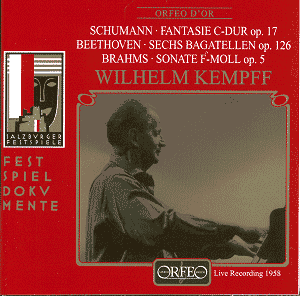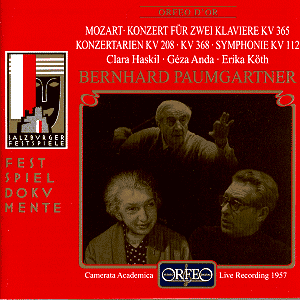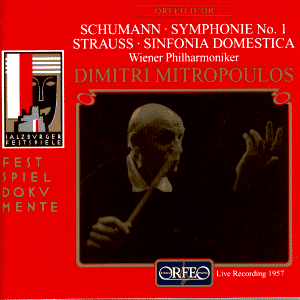
Works: Robert Schumann – Fantasie in C Op. 17; Ludwig van Beethoven – Six Bagatelles Op. 126; Johannes Brahms – Sonata in F Minor Op. 5
Performers: Wilhelm Kempff (piano)
Recording: Live at the 1958 Salzburg Festival
Label: ORFEO D’OR C 570 011 B
Wilhelm Kempff, a towering figure of 20th-century piano performance, made his solitary appearance at the Salzburg Festival in 1958, a year steeped in historical significance for both the festival and classical music at large. This recording provides a rare glimpse into the artistry of a pianist who navigated through the Romantic repertoire with a unique blend of spontaneity and rhythmic precision. The selected works—Schumann’s deeply introspective Fantasie, Beethoven’s late Bagatelles, and Brahms’ youthful Sonata—each reflect the emotional landscapes and technical demands of their respective composers, offering a rich tapestry for Kempff’s interpretative insights.
Kempff’s interpretation of Schumann’s Fantasie is particularly noteworthy for its emotional depth and poetic phrasing. From the outset, he captures the work’s inherent duality: the tension between exuberance and melancholy. His phrasing is characterized by a sensitive touch that allows for a fluid exploration of the work’s intricate harmonic shifts. The first movement unfolds with a sense of yearning, and Kempff’s ability to delineate the thematic material while maintaining a cohesive narrative arc is remarkable. The climactic moments are infused with a dynamic contrast that highlights Schumann’s Romantic fervor, while his delicate handling of the quieter passages evokes introspection, drawing the audience into the emotional core of the piece.
In juxtaposition, the Beethoven Bagatelles present a different interpretative challenge, one that Kempff navigates with dexterous ease. These late works, often overshadowed in concert settings, benefit from his clarity and simplicity. Kempff’s articulation of the intricate counterpoint in the Bagatelles is particularly striking; he refrains from overemphasizing the more florid phrases, instead opting for a lightness that allows the music’s playful nature to shine through. This choice enhances the conversational quality of the pieces, a hallmark of Beethoven’s late style, and showcases Kempff’s mastery in balancing technical precision with expressive freedom.
The Brahms Sonata in F Minor, a substantial work filled with youthful exuberance and Romantic intensity, serves as a fitting culmination to this recital. Kempff’s interpretation is both bold and nuanced; he confronts the technical complexities of the first movement with confidence, executing rapid passages with clarity and control. His ability to convey the sonata’s dramatic contrasts—shifting effortlessly from tempestuous energy to lyrical introspection—demonstrates a profound understanding of Brahms’ stylistic language. The vivid colors he paints through dynamic shading and tonal variation bring a freshness to the work, revealing layers of meaning that resonate well beyond mere technical execution.
The sound quality of this live recording captures the ambiance of the Mozarteum, providing an authentic listening experience that mirrors the immediacy of a concert setting. The engineering by ORFEO D’OR allows Kempff’s nuanced touch to emerge clearly, with a natural balance between piano and hall resonance. This transparency is especially valuable in the quieter passages of the Schumann and Beethoven works, where the subtleties of Kempff’s playing can be fully appreciated.
In the landscape of Kempff’s recorded legacy, this performance stands out not only for its historical context but also for its artistic integrity. It fills a notable gap in his discography, particularly regarding Beethoven and Brahms, while reinforcing his status as a preeminent interpreter of the Romantic repertoire. The interplay of technical prowess and emotional depth in this Salzburg recital reflects the enduring brilliance of Kempff’s artistry, making this recording an essential addition to the collections of both connoisseurs and casual listeners alike. The convergence of Kempff’s interpretative vision with the works of Schumann, Beethoven, and Brahms results in a listening experience that is both enlightening and profoundly moving.

